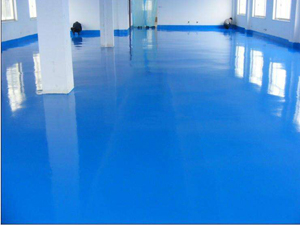The use of conductive mica powder to develop light-colored epoxy anti-static coatings is not only the choice of conductive powder, but also the choice of epoxy curing agent. It is pointed out that the light-colored epoxy antistatic coating uses an aromatic amine type curing agent, and the obtained film has better electrical resistivity, corrosion resistance and chemical resistance than the conventional polyamide curing agent.
Light-colored epoxy anti-static coating is one of the research and application hotspots of the coating industry in the past decade. Especially the floor anti-static coating has been used in the manufacturing floor of electronics, microelectronics, communication, computer, precision instruments, etc.; Industrial explosion-proof flammable workshops; medical, food hygiene and clean workshops have been widely used in many industries, and the light-colored anti-corrosion coatings used on the inner wall of petrochemical storage and transportation equipment are a sudden emergence, and there is a tendency to rise.
The antistatic properties of epoxy coatings can be obtained in various ways, such as adding antistatic additives, adding carbon black, graphite, metal powder, conductive fibers, conductive mica powder, and the like. At present, it has become a mainstream to obtain a stable light-colored conductive coating by adding a light-colored conductive mica powder to an epoxy paint. In recent years, it has been applied to almost all anti-static fields and has been widely praised.
After determining the key raw material of conductive mica powder, the choice of epoxy curing agent can be added to the effect.
1 Experimental part
1.1 Raw materials and instruments
Epoxy resin, Kunshan Guodu Chemical; conductive mica powder, Shanghai Junjiang Technology; D0115 polyamide curing agent, Shanghai Duer Chemical; D8190 aromatic amine curing agent, Shanghai Du Er Chemical; anti-static test instrument, Shanghai Junjiang Technology.
1.2 Experimental formula
Experimental formula for light epoxy conductive paint.
The coating was formulated according to the formulation to make a wet film of about 180 μm, dried at 15 ° C, and the dry film thickness was about 100 μm, and the resistivity of the paint film was tested after different drying times.
1.3 Effect of drying time on resistivity of paint film
It can be seen that when the arylamine curing agent D1890 is used, the surface resistivity of the paint film is lowered rapidly.

1.4 Effect of curing temperature on resistivity of paint film
After the above wet film was dried for 7 days in different temperature environments (dry film was about 100 μm), the electrical resistivity was tested, and the results are shown in Table 3.
Paint resistivity index at different curing temperatures
It can be seen that when the arylamine curing agent D8190 is used, the surface resistivity of the paint film is low, and the lower the curing temperature, the greater the difference between the two.
1.5 Comparison of resistant acetic acid
After the above wet film was dried for 7 days under different temperature conditions (dry film about 100 μm), it was immersed in a 10% aqueous acetic acid solution to test the pencil hardness of the coating film. The results are shown in Table 4.
Comparison of resistant to dilute acetic acid
Among the common organic chemicals, acetic acid has the most severe damage to the organic paint film. When using the arylamine curing agent, the paint film has a good resistance to dilute acetic acid: the paint film using the polyamide curing agent.
1.6 salt spray resistance comparison
The salt spray resistance test was carried out for 800 h according to ASTMB117, and the results are shown in Table 5.
Salt spray resistance comparison
It can be seen that the salt spray resistance of the paint film is better when the arylamine curing agent is used.
2 Theoretical explanation for the excellent performance of arylamine curing agent
Compared with polyamide, the excellent performance of the film obtained by the arylamine curing agent D8190 is mainly determined by its structure. The rigid structural unit containing a diphenyl ring and the flexible structural unit of a long hydrocarbon chain in the molecule have complete compatibility with the liquid epoxy and excellent wetting and coating effect on the pigment and filler in the paint. Therefore, the cured epoxy paint film is extremely dense, and has excellent salt spray resistance and dilute acetic acid resistance. In addition, the phenolic hydroxyl group on the benzene ring contained in the molecule has a catalytic action, and the amine group is bonded to the hydrocarbon group, so that the epoxy group is bonded to the epoxy group. The reaction speed of the base is fast, so that the viscosity of the paint film after coating is rapidly increased, thereby effectively preventing the migration of the conductive powder in the paint film, maintaining the uniform distribution of the conductive powder in the paint film, reducing the surface resistivity, and drying. At higher temperatures, the difference in reaction rate between the arylamine curing agent D8190 and the polyamide curing agent D0115 is small, so the difference in resistivity of the paint film is reduced, and when the drying temperature is low, the arylamine curing agent D8190 and the polyamide curing agent D0115 are The difference in reaction rate is widened, and the difference in resistivity of the paint film is amplified.
3 Conclusion
(1) When the arylamine curing agent D8190 is used for light-colored epoxy antistatic coating, it can obtain lower resistivity not only when the temperature is lower, but also resistant to dilute acetic acid and salt spray resistance. It can also be used in high solids epoxy coatings. Compared with traditional polyamide curing agents, it has obvious performance advantages, so it is especially suitable for light-colored antistatic coatings on the inner wall of oil tanks.
(2) The performance comparison of the paint film using the arylamine curing agent D8190 and the polyamide curing agent D0115 against other chemicals remains to be further studied.
